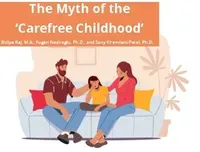How Little We Know
.webp)
By: Michael Upston, LCSW
According to Wikipedia, the universe is close to 14 billion years old, and from what we can observe, has 2 trillion galaxies and a diameter of 93 billion light years. The earth alone is over four billion years old, and currently houses seven and a half billion people. If everything really is interconnected, then all of this goes into making up the current moment. With that in mind, how much do you, or any of us, really know?
At first glance, mental health treatment is all about knowing. It involves understanding feelings, thoughts, and situations more clearly so we can respond to them effectively. However, in reality, coping with life is equally about finding ways to deal with what we do not know; for example, the vast majority of what is actually happening at any given moment.
We like to feel in control because it gives us a sense of security. If we can control a situation, then the outcome is in our hands. This mind-set has informed our cultural narrative from its beginning - to be self made, to control our own destiny, and like Old Blue Eyes sang, to do it our way. But what gives us comfort is not always what is real, and deep down we all know that the pillars of the earth do not rest on anything that even slightly resembles our shoulders.
So what to do? Should we try harder to control as much as possible, even if it ends up being very little, or should we become nihilistic and blindly throw ourselves into the arms of fate? Perhaps there is another way, and it is this other way that I want to explore in this blog.
At times I work with older teens and young adults who are having anxiety about starting or returning to college. There can be many reasons for this, but an underlying issue is often feelings of self doubt, beliefs that they cannot successfully cope with the challenges that come with managing college and learning to be more independent. Part of addressing these beliefs is uncovering what the facts are, what is actually known. For example, if a young person is afraid of not being able to pass his courses, we can look at earlier school experiences to see if this concern is based on facts. If the person has experienced passing courses to which he applied himself, then there is good reason to believe he will do well if he makes the necessary effort. However, this approach only goes so far, because in order to really transcend our fears, there needs to be an experiential dimension. True confidence will only come when the person returns to school and experiences himself doing well.
It is at this point that we step into the unknown because we can’t fully predict future experiences from past experiences. No amount of positive thinking can tell us what is going to happen. We just don’t know. I can’t really tell a client what his experience will be when he returns to school. But what I can encourage him to do is to be aware of what his goals are, and to try to effectively engage the moment with those goals in mind. The only way we can learn or accomplish anything is not through being some sort of armchair philosopher who speculates on the front end about how things will turn out, but rather through engaging in what is, through participating in it (Linehan, 2015).
Our fears and concerns, especially when they involve the future, are at best based in a very limited perspective, so we must find a way to get beyond them, to operate outside of them. This is accomplished by throwing ourselves into the moment, and trying to respond effectively to what is there; by seeing what actually happens, and responding to the reality that presents itself. As my brother told me many years ago, “Don’t think, do. You spend far too much time thinking." As much as I don’t like to admit it, I think he was on to something.
References
Linehan, M. M. (2015). DBT skills training handouts and worksheets. New York: Guilford Press.
More Blog Posts
.webp)
Benefits of Altruism: Helping Others Is a Way to Help Yourself

The Myth of The "Carefree Childhood"
.webp)
Positive Clinical Psychology - Part II

You can experience life again. Let’s take steps together.
At Bio Behavioral Institute, we’re here to be your team and get you back to the life you deserve. Schedule your consultation and take the first step towards a more meaningful life.
Call our office at 516-487-7116 or complete the form to schedule your consultation.
